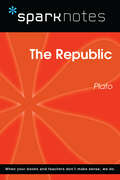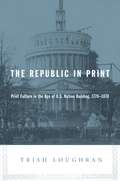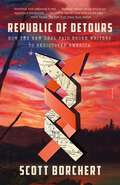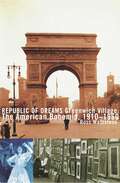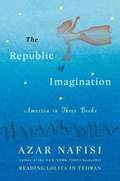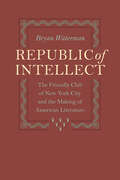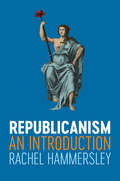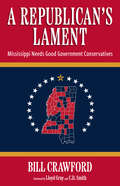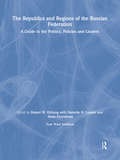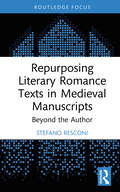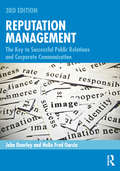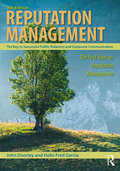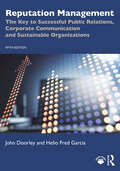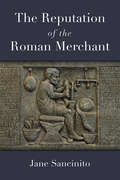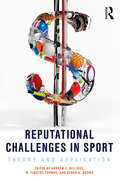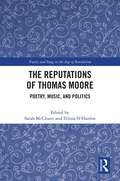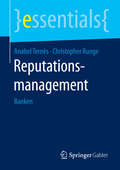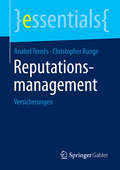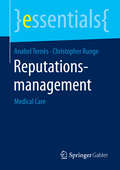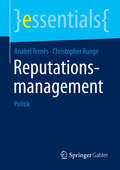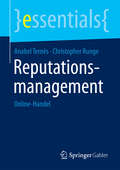- Table View
- List View
The Republic (SparkNotes Philosophy Guide)
by SparkNotesThe Republic (SparkNotes Philosophy Guide) Making the reading experience fun! SparkNotes Philosophy Guides are one-stop guides to the great works of philosophy–masterpieces that stand at the foundations of Western thought. Inside each Philosophy Guide you&’ll find insightful overviews of great philosophical works of the Western world.
The Republic in Print: Print Culture in the Age of U.S. Nation Building, 1770-1870
by Trish Loughran"In the beginning, all the world was America."-John LockeIn the beginning, everything was America, but where did America begin? In many narratives of American nationalism (both popular and academic), the United States begins in print-with the production, dissemination, and consumption of major printed texts like Common Sense , the Declaration of Independence, newspaper debates over ratification, and the Constitution itself. In these narratives, print plays a central role in the emergence of American nationalism, as Americans become Americans through acts of reading that connect them to other like-minded nationals.In The Republic in Print, however, Trish Loughran overturns this master narrative of American origins and offers a radically new history of the early republic and its antebellum aftermath. Combining a materialist history of American nation building with an intellectual history of American federalism, Loughran challenges the idea that print culture created a sense of national connection among different parts of the early American union and instead reveals the early republic as a series of local and regional reading publics with distinct political and geographical identities.Focusing on the years between 1770 and 1870, Loughran develops two richly detailed and provocative arguments. First, she suggests that it was the relative lack of a national infrastructure (rather than the existence of a tightly connected print network) that actually enabled the nation to be imagined in 1776 and ratification to be secured in 1787-88. She then describes how the increasingly connected book market of the 1830s, 1840s, and 1850s unexpectedly exposed cracks in the evolving nation, especially in regards to slavery, exacerbating regional differences in ways that ultimately contributed to secession and civil war.Drawing on a range of literary, historical, and archival materials-from essays, pamphlets, novels, and plays, to engravings, paintings, statues, laws, and maps- The Republic in Print provides a refreshingly original cultural history of the American nation-state over the course of its first century.
Republic of Detours: How the New Deal Paid Broke Writers to Rediscover America
by Scott BorchertA New York Times Book Review Editors' ChoiceAn immersive account of the New Deal project that created state-by-state guidebooks to America, in the midst of the Great Depression—and employed some of the biggest names in American lettersThe plan was as idealistic as it was audacious—and utterly unprecedented. Take thousands of hard-up writers and put them to work charting a country on the brink of social and economic collapse, with the aim of producing a series of guidebooks to the then forty-eight states—along with hundreds of other publications dedicated to cities, regions, and towns—while also gathering reams of folklore, narratives of formerly enslaved people, and even recipes, all of varying quality, each revealing distinct sensibilities. All this was the singular purview of the Federal Writers’ Project, a division of the Works Progress Administration founded in 1935 to employ jobless writers, from once-bestselling novelists and acclaimed poets to the more dubiously qualified. The FWP took up the lofty goal of rediscovering America in words and soon found itself embroiled in the day’s most heated arguments regarding radical politics, racial inclusion, and the purpose of writing—forcing it to reckon with the promises and failures of both the New Deal and the American experiment itself. Scott Borchert’s Republic of Detours tells the story of this raucous and remarkable undertaking by delving into the experiences of key figures and tracing the FWP from its optimistic early days to its dismemberment by the House Committee on Un-American Activities. We observe notable writers at their day jobs, including Nelson Algren, broke and smarting from the failure of his first novel; Zora Neale Hurston, the most widely published Black woman in the country; and Richard Wright, who arrived in the FWP’s chaotic New York City office on an upward career trajectory courtesy of the WPA. Meanwhile, Ralph Ellison, Studs Terkel, John Cheever, and other future literary stars found encouragement and security on the FWP payroll. By way of these and other stories, Borchert illuminates an essentially noble enterprise that sought to create a broad and inclusive self-portrait of America at a time when the nation’s very identity and future were thrown into question. As the United States enters a new era of economic distress, political strife, and culture-industry turmoil, this book’s lessons are urgent and strong.
Republic of Dreams: Greenwich Village: The American Bohemia, 1910-1960
by Ross WetzsteonIf the twentieth century was the American century, it can be argued that it was more specifically the New York century, and Greenwich Village was the incubator of every important writer, artist, and political movement of the period. From the century's first decade through the era of beatniks and modern art in the 1950s and '60s, Greenwich Village was the destination for rebellious men and women who flocked there from all over the country to fulfill their artistic, political, and personal dreams. It has been called the most significant square mile in American cultural history, for it holds the story of the rise and fall of American socialism, women's suffrage, and the commercialization of the avant-garde. One Villager went so far as to say that "everything started in the Village except Prohibition," and in the 1940s, the young actress Lucille Ball said, "The Village is the greatest place in the world." What other community could claim a spectrum ranging from Henry James to Marlon Brando, from Marcel Duchamp to Bob Dylan, from Gertrude Vanderbilt Whitney to Abbie Hoffman? The story of the Village is, in large part, the stories old Villagers have told new Villagers about former Villagers, and to tell its story is in large part to tell its legends. Republic of Dreams presents the remarkable, outrageous, often interrelated biographies of the giants of American journalism, poetry, drama, radical politics, and art who flocked to the Village for nearly half a century, among them Eugene O'Neill, whose plays were first produced by the Provincetown Players on Macdougal Street, for whom Edna St. Vincent Millay also wrote; Jackson Pollock, who moved to the Village from Wyoming in 1930 and was soon part of the group of 8th Street painters who would revolutionize Western painting; E. E. Cummings, who lived for years on Patchin Place, as did Djuna Barnes; Max Eastman, who edited the groundbreaking literary and political journal The Masses, which introduced Freud to the American public and also published Sherwood Anderson, Amy Lowell, Upton Sinclair, Maksim Gorky, and John Reed's reporting on the Russian Revolution. Republic of Dreams is beautifully researched, outspoken, wise, hip, exuberant, a monumental, definitive history that will endure for decades to come.
The Republic of Imagination
by Azar NafisiThe author of the beloved #1 New York Times bestseller Reading Lolita in Tehran returns with the next chapter of her life in books--a passionate and deeply moving hymn to America Ten years ago, Azar Nafisi electrified readers with her multimillion-copy bestseller Reading Lolita in Tehran, which told the story of how, against the backdrop of morality squads and executions, she taught The Great Gatsby and other classics of English and American literature to her eager students in Iran. In this electrifying follow-up, she argues that fiction is just as threatened--and just as invaluable--in America today.Blending memoir and polemic with close readings of her favorite novels, she describes the unexpected journey that led her to become an American citizen after first dreaming of America as a young girl in Tehran and coming to know the country through its fiction. She urges us to rediscover the America of The Wonderful Wizard of Oz and Adventures of Huckleberry Finn and challenges us to be truer to the words and spirit of the Founding Fathers, who understood that their democratic experiment would never thrive or survive unless they could foster a democratic imagination. Nafisi invites committed readers everywhere to join her as citizens of what she calls the Republic of Imagination, a country with no borders and few restrictions, where the only passport to entry is a free mind and a willingness to dream.From the Trade Paperback edition.
The Republic of Imagination
by Azar NafisiA passionate hymn to the power of fiction to change people's lives, by the #1 New York Times bestselling author of Reading Lolita in Tehran Ten years ago, Azar Nafisi electrified readers with her million-copy bestseller, Reading Lolita in Tehran, which told the story of how, against the backdrop of morality squads and executions, she taught The Great Gatsby and other classics to her eager students in Iran. In this exhilarating followup, Nafisi has written the book her fans have been waiting for: an impassioned, beguiling, and utterly original tribute to the vital importance of fiction in a democratic society. What Reading Lolita in Tehran was for Iran, The Republic of Imagination is for America. Taking her cue from a challenge thrown to her in Seattle, where a skeptical reader told her that Americans don't care about books the way they did back in Iran, she energetically responds to those who say fiction has nothing to teach us. Blending memoir and polemic with close readings of her favorite American novels--The Adventures of Huckleberry Finn, Babbitt, and The Heart Is a Lonely Hunter, among others--she invites us to join her as citizens of her "Republic of Imagination," a country where the villains are conformity and orthodoxy and the only passport to entry is a free mind and a willingness to dream.
Republic of Intellect: The Friendly Club of New York City and the Making of American Literature (New Studies in American Intellectual and Cultural History)
by Bryan WatermanIn the 1790s, a single conversational circle—the Friendly Club—united New York City's most ambitious young writers, and in Republic of Intellect, Bryan Waterman uses an innovative blend of literary criticism and historical narrative to re-create the club's intellectual culture. The story of the Friendly Club reveals the mutually informing conditions of authorship, literary association, print culture, and production of knowledge in a specific time and place—the tumultuous, tenuous world of post-revolutionary New York City. More than any similar group in the early American republic, the Friendly Club occupied a crossroads—geographical, professional, and otherwise—of American literary and intellectual culture. Waterman argues that the relationships among club members' novels, plays, poetry, diaries, legal writing, and medical essays lead to important first examples of a distinctively American literature and also illuminate the local, national, and transatlantic circuits of influence and information that club members called "the republic of intellect." He addresses topics ranging from political conspiracy in the gothic novels of Charles Brockden Brown to the opening of William Dunlap's Park Theatre, from early American debates on gendered conversation to the publication of the first American medical journal. Voluntary association and print culture helped these young New Yorkers, Waterman concludes, to produce a broader and more diverse post-revolutionary public sphere than scholars have yet recognized.
Republicanism: An Introduction
by Rachel HammersleyRepublicanism is a centuries-old political tradition, yet its precise meaning has long been contested. The term has been used to refer to government in the public interest, to regimes administered by a collective body or an elected president, and even just to systems embodying the values of liberty and civic virtue. But what do we really mean when we talk about republicanism? In this new book, leading scholar Rachel Hammersley expertly and accessibly introduces this complex but important topic. Beginning in the ancient world, she traces the history of republican government in theory and practice across the centuries in Europe and North America, concluding with an analysis of republicanism in our contemporary politics. She argues that republicanism is a dynamic political language, with each new generation of thinkers building on the ideas of their predecessors and adapting them in response to their own circumstances, concerns, and crises. This compelling account of the origins, history, and potential future of one of the world’s most enduring political ideas will be essential reading for anyone with an interest in republicanism, from historians and political theorists to politicians and ordinary citizens.
Republicanism, Rhetoric, and Roman Political Thought
by Daniel J. KapustRepublicanism, Rhetoric, and Roman Political Thought develops readings of Rome's three most important Latin historians – Sallust, Livy and Tacitus – in light of contemporary discussions of republicanism and rhetoric. Drawing on recent scholarship as well as other classical writers and later political thinkers, this book develops interpretations of the three historians' writings centering on their treatments of liberty, rhetoric, and social and political conflict. Sallust is interpreted as an antagonistic republican, for whom elite conflict serves as an outlet and channel for the antagonisms of political life. Livy is interpreted as a consensualist republican, for whom character and its observation helps to maintain the body politic. Tacitus is interpreted as being centrally concerned with the development of prudence and as a subtle critic of imperial rule.
A Republican's Lament: Mississippi Needs Good Government Conservatives
by Bill CrawfordBill Crawford thought his modern-day Republican Party would lift Mississippi off the bottom, a notion born of Gil Carmichael’s vision for good government conservatism. A Republican’s Lament tells of Crawford’s dedicated efforts to implement Carmichael’s vision, his keen observations of Mississippi’s struggles, and his critical commentaries over the past half century.For more than fifty years, few people have had a better view or a wider variety of roles in the ups and downs of Mississippi and its communities than Crawford. The Canton native has been a daily newspaper reporter, a crusading small-town weekly editor, a Republican Party leader, a reform-minded Republican state representative, an influential Institutions of Higher Learning board trustee, a successful banker, a community college administrator, a state economic development official, a community development leader and nonprofit founder, a mentor of developing community leaders, and a syndicated political columnist. From Gil Carmichael's vision for good government and Haley Barbour’s pragmatic conservatism to starve the beast and truth management politics, poverty and the Cycle of Prosperity, Faulkner’s curse and other behavioral shadows, the Ayers case, and more, Crawford weaves a unique and eventful story about his home state’s enduring dilemmas and a clarion call for its better possibilities.
The Republics and Regions of the Russian Federation: A Guide to the Politics, Policies and Leaders
by Robert W. Orttung East West InsituteRussia is divided into seven federal districts encompassing 89 units -- regions (oblasts), territories (krais), and republics. As central power has weakened, the importance of these units and their local leadership has increased commensurately.This work brings together in one volume all basic political, economic, and demographic data on every territorial unit of the Russian Federation, its local government structure, and electoral history current through the spring 2000 elections and the summer 2000 reorganization. Each entry includes an extensive profile of the president, governor, or prime minister, and an overview of local political trends, policies, economy, and business conditions.
Repurposing Composition: Feminist Interventions for a Neoliberal Age
by Shari J StenbergIn Repurposing Composition, Shari J. Stenberg responds to the increasing neoliberal discourse of academe through the feminist practice of repurposing. In doing so, she demonstrates how tactics informed by feminist praxis can repurpose current writing pedagogy, assessment, public engagement, and other dimensions of writing education. Stenberg disrupts entrenched neoliberalism by looking to feminism's long history of repurposing "neutral" practices and approaches to the rhetorical tradition, the composing process, and pedagogy. She illuminates practices of repurposing in classroom moments, student writing, and assessment work, and she offers examples of institutions, programs, and individuals that demonstrate a responsibility approach to teaching and learning as an alternative to top-down accountability logic. Repurposing Composition is a call for purposes of work in composition and rhetoric that challenge neoliberal aims to emphasize instead a public-good model that values difference, inclusion, and collaboration.
Repurposing Composition: Feminist Interventions for a Neoliberal Age
by Shari J. StenbergIn Repurposing Composition, Shari J. Stenberg responds to the increasing neoliberal discourse of academe through the feminist practice of repurposing. In doing so, she demonstrates how tactics informed by feminist praxis can repurpose current writing pedagogy, assessment, public engagement, and other dimensions of writing education. Stenberg disrupts entrenched neoliberalism by looking to feminism’s long history of repurposing “neutral” practices and approaches to the rhetorical tradition, the composing process, and pedagogy. She illuminates practices of repurposing in classroom moments, student writing, and assessment work, and she offers examples of institutions, programs, and individuals that demonstrate a responsibility approach to teaching and learning as an alternative to top-down accountability logic. Repurposing Composition is a call for purposes of work in composition and rhetoric that challenge neoliberal aims to emphasize instead a public-good model that values difference, inclusion, and collaboration.
Repurposing Literary Romance Texts in Medieval Manuscripts: Beyond the Author (Young Feltrinelli Prize in the Moral Sciences)
by Stefano ResconiTranscribing a text within a Medieval manuscript was often not a culturally and ideologically neutral act. The lack of direct control by the authors over the circulation of their works allowed scribes to employ particularly refined strategies aimed at assigning new functions and meanings to these texts, which might appear very different from the original to the readers. This could be achieved in various ways, such as manipulating the configuration of the manuscript, creating or emphasising textual connections within organised collections, exploiting paratexts, or making more significant alterations to the text itself.This volume provides an overview of the primary ways in which textual repurposing and the consequent guiding of the reader are achieved within the manuscript tradition of Medieval Romance literary texts. Each method is described and exemplified through detailed analysis of particularly significant cases, which not only offer interesting insights into the perception of authorship in this literary context but also reveal unexpected ways through which manuscript compilers revitalise and enhance the communication of the works they handle.This book will be of interest to readers of Romance Medieval literature, Medieval manuscript culture, and material philology.
Reputation Management: The Key to Successful Public Relations and Corporate Communication
by John Doorley Helio Fred GarciaReputation Management is a how-to guide for students and professionals, as well as CEOs and other business leaders. It rests on the premise that reputation can be measured, monitored, and managed. Organized by corporate communication units including media relations, employee communication, government relations, and investor relations, the book provides a field-tested guide to corporate reputation problems such as leaked memos, unfair treatment by the press, and negative rumors, and focuses on practical solutions. Each chapter is fleshed out with the real-world experience of the authors and contributors, who come from a wide range of professional corporate communication backgrounds. Updates to the third edition include: Global content has been incorporated and expanded throughout the book, rather than being restricted to only one chapter. Opening vignettes, examples, and case studies have been updated in each chapter. Additional case studies and examples with an international focus have been added.
Reputation Management: The Key to Successful Public Relations and Corporate Communication
by John Doorley Helio Fred GarciaReputation Management is an established how-to guide for students and professionals, as well as CEOs and other business leaders. This fourth edition is updated throughout, including: new social media management techniques for the evolving age of digital media, and perspectives on reputation management in an era of globalization. The book is embroidered by ethics, and organized by corporate communication units, such as media relations, issues management, crisis communication, organizational communication, government relations, and investor relations. Each chapter is fleshed out with the real-world experiences cited by the authors and contributions from 36 leaders in the field, including The Arthur W. Page Society, the International Communications Consultancy Organization, the PR Council, CVS Health, Edelman and Ketchum. This was the first book on reputation management and, now in its fourth edition, remains a must-have reference for students taking classes in public relations management, corporate communication, communication management, and business. CEOs, business leaders, and professionals working in these areas find it a reliable resource for measuring, monitoring and managing reputation.
Reputation Management: The Key to Successful Public Relations, Corporate Communication and Sustainable Organizations
by null John Doorley null Helio Fred GarciaThe fifth edition of this classic text, which was the first on the subject of reputation management, gives readers the guidance and skills needed to manage brand and reputation through effective performance, behavior, identity and communication strategies.This edition is updated throughout, including current information on digital media, new global examples and a renewed emphasis on organizational and environmental sustainability. Each chapter again features timely and illustrative cases by the authors and contributions from leaders in the field, with new cases in this edition on such topics as COVID-19, artificial intelligence, and generative AI. Additionally, the book maintains its consistent throughline focusing on corporate ethics.This fifth edition is a must-have reference for students taking classes in public relations management, corporate communication, communication management and business. CEOs, business leaders and professionals working in these areas find it a reliable resource for measuring, monitoring and managing reputation.Online resources also accompany the text. Please visit www.routledge.com/9781032577999.
The Reputation of the Roman Merchant (Law And Society In The Ancient World)
by Jane SancinitoRoman merchants, artisans, and service providers faced substantial prejudice. Contemporary authors labeled them greedy, while the Roman on the street accused merchants of lying and cheating. Legally and socially, merchants were kept at arm’s length from respectable society. Yet merchants were common figures in daily life, populating densely packed cities and traveling around the Mediterranean. The Reputation of the Roman Merchant focuses on the strategies retailers, craftsmen, and many other workers used to succeed, examining how they developed good reputations despite the stigma associated with their work. In a novel approach, blending social and economic history, The Reputation of the Roman Merchant considers how reputation worked as an informal institution, establishing and reinforcing traditional Roman norms while lowering the cost of doing business for individual workers. From histories and novels to inscriptions and art, this volume identifies common reputation strategies, explores how points of pride and personal accomplishments were shared with others, and explains responses to merchant activities on the small-scale. The book concludes that merchants invested heavily in their reputations as a way to set themselves apart from common, negative stereotypes without admitting that there was anything shameful about the work they did.
Reputational Challenges in Sport: Theory and Application
by Andrew C. Billings Timothy Coombs Kenon A. BrownIssues of reputation management are negotiated in a wide array of contexts, yet arguably one of the most visible of these areas involves how such stories unfold within the sporting arena. Whether involving individual athletes, teams, organizations, leagues, or global entities, the process of navigating issues of image repair and/or restoration and crisis-based communication has never been more byzantine with a plethora of communicative media outlets functioning in myriad manners. Reputational Challenges in Sport explores the intersection of reputation, sport, and society. In doing so, the book advances theory and then explores individual, team, and organizational applications from varied methodological perspectives as they relate to reputation and identity management and crisis orientations. The book provides a synthesis of previous works while offering a contemporary advancement of these subjects from a variety of epistemological approaches. It gives voice to variety of perspectives that offer a robust advancement of issues relating to reputation, sport, and modern society.
The Reputations of Thomas Moore: Poetry, Music and Politics (Poetry and Song in the Age of Revolution)
by Sarah McCleave Triona O'HanlonThis collection of eleven essays positions Moore within a developing and expanding international readership during the course of the nineteenth century. In accounting for the successes he achieved and the challenges he faced, recurring themes include: Moore’s influence and reputation; modes of dissemination through networks and among communities; also, the articulation of personal, political, and national identities. This book, the product of an international team of scholars, is the first to focus explicitly on the reputations of Thomas Moore in different parts of the world, including Bombay, Dublin, Leipzig, and London, as well as America, Canada, Greece, and the Hispanic world. Through it, we will understand more about Moore’s reception, and also appreciate how the publication and dissemination of poetry and song in the romantic and Victorian eras operated in different parts of the world—in particular considering how artistic and political networks effected the transmission of cultural products.
Reputationsmanagement: Banken (essentials)
by Anabel Ternès Christopher RungeAnabel Ternès und Christopher Runge zeigen am Beispiel Banken, dass es sich auszahlt, in eine hohe Reputation zu investieren. Unternehmen mit einem guten Ansehen können höhere Preise verlangen, Kunden gewinnen und binden, die besten Mitarbeiter für sich gewinnen und insbesondere in Krisenzeiten von ihrer Reputation als immateriellem Wert als Wettbewerbsvorteil zehren. Voraussetzung hierfür ist ein systematisches, professionell begleitetes Reputationsmanagement, das gewährleistet, in Zukunft zu agieren statt nur zu reagieren. Gutes Reputationsmanagement erfordert einzelne, aufeinander abgestimmte Schritte, die sich gegenseitig perfekt ergänzen – zum Aufbau, zum Erhalt und zur Verbesserung einer positiven Unternehmensreputation.
Reputationsmanagement: Versicherungen (essentials)
by Anabel Ternès Christopher RungeAnabel Ternès und Christopher Runge zeigen am Beispiel Versicherungen, dass es sich auszahlt, in eine hohe Reputation zu investieren. Unternehmen mit einem guten Ansehen können höhere Preise verlangen, Kunden gewinnen und binden, die besten Mitarbeiter für sich gewinnen und insbesondere in Krisenzeiten von ihrer Reputation als immateriellem Wert als Wettbewerbsvorteil zehren. Voraussetzung hierfür ist ein systematisches, professionell begleitetes Reputationsmanagement, das gewährleistet, in Zukunft zu agieren statt nur zu reagieren. Gutes Reputationsmanagement erfordert einzelne, aufeinander abgestimmte Schritte, die sich gegenseitig perfekt ergänzen – zum Aufbau, zum Erhalt und zur Verbesserung einer positiven Unternehmensreputation.
Reputationsmanagement: Medical Care (essentials)
by Anabel Ternès Christopher RungeAnabel Ternès und Christopher Runge zeigen am Beispiel Banken, dass es sich auszahlt, in eine hohe Reputation zu investieren. Unternehmen mit einem guten Ansehen können höhere Preise verlangen, Kunden gewinnen und binden, die besten Mitarbeiter für sich gewinnen und insbesondere in Krisenzeiten von ihrer Reputation als immateriellem Wert als Wettbewerbsvorteil zehren. Voraussetzung hierfür ist ein systematisches, professionell begleitetes Reputationsmanagement, das gewährleistet, in Zukunft zu agieren statt nur zu reagieren. Gutes Reputationsmanagement erfordert einzelne, aufeinander abgestimmte Schritte, die sich gegenseitig perfekt ergänzen - zum Aufbau, zum Erhalt und zur Verbesserung einer positiven Unternehmensreputation.
Reputationsmanagement: Politik (essentials)
by Anabel Ternès Christopher RungeAnabel Ternès und Christopher Runge zeigen am Beispiel Politik, dass es sich auszahlt, in eine hohe Reputation zu investieren. Gerade wer ein politisches Amt bekleidet, steht besonders im Fokus der öffentlichen Aufmerksamkeit. Jede Geste, jedes Wort kann von sozialen Netzwerken und Online-Medien aufgegriffen und in Windeseile verbreitet werden. Klassische Medien wie Tageszeitungen, Magazine und auch TV-Sendungen verbreiten die Nachricht zusätzlich weiter, und im Nu ist ein Skandal entstanden, dessen Folgen unabsehbar sind und oftmals das Ende der Karriere bedeuten. Wichtig ist daher, proaktiv vorzubauen, um den guten Ruf im Netz zu schützen – mit einem professionellen Partner an der Seite.
Reputationsmanagement: Online-Handel (essentials)
by Anabel Ternès Christopher RungeAnabel Ternès und Christopher Runge zeigen am Beispiel des Online-Handels, dass es sich auszahlt, in eine hohe Reputation zu investieren. Räumliche Grenzen existieren in Zeiten von Social Media nicht mehr. Binnen Sekunden verbreiten sich schlechte Nachrichten und Bewertungen über soziale Netzwerke und Internetforen – ob sie nun der Wahrheit entsprechen oder nicht. Eine negative Information entwickelt auf diese Weise schnell ein unkontrollierbares Eigenleben – mit unabsehbaren Folgen. Gerade im Online-Handel ist es wichtig, stets den Überblick zu behalten, was „das Netz“ über das eigene Unternehmen sagt. Negative Kundenbewertungen und schlechte Presse können zu Umsatzeinbußen führen und den Ruf nachhaltig schädigen. Wichtig ist daher, proaktiv vorzubauen, um den guten Ruf im Netz zu schützen – mit einem professionellen Partner an der Seite, der strategisch vorausplant.
